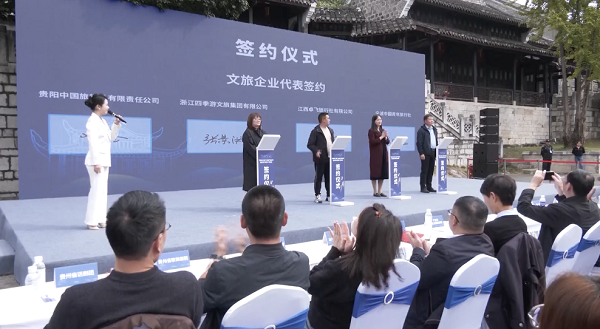

Representatives from Guizhou, Zhejiang and Jiangxi sign cooperation agreements at the event. [Photo/WeChat account of Zhizhi Guiyang]
The "Yangming Sanwanli" culture and tourism industry cooperation initiative signing and promotion conference was held at Yangming Temple in Guiyang, capital of Southwest China's Guizhou province, on Nov 8.
Over 100 representatives from the culture and tourism departments, travel agencies, cultural and creative enterprises, and performing art companies from Guizhou, Zhejiang, and Jiangxi provinces attended the event.
During the promotion conference, the culture and tourism departments of Guizhou, Zhejiang and Jiangxi promoted Yangming culture and tourism, while representatives from the county-level culture and tourism departments, as well as enterprises involved in culture and tourism, culture and creativity, and performing arts in the three provinces signed cooperation agreements.
A drama created by the Guiyang Radio and Television Media Group made its debut at the conference, depicting a dialogue between ancient and modern times as actors retraced Wang Yangming's footsteps in Guizhou, showcasing the culture and tourism highlights of Colorful Guizhou and Cool Guiyang.
The life of Wang Yangming, a philosopher during the Ming Dynasty (1268-1644), was closely connected to Zhejiang, Guizhou and Jiangxi. His birth, enlightenment and achievements took place in these three provinces, infusing them with a unique cultural charm and rich history. His thoughts and theories have also been widely disseminated and preserved in the three provinces.
The event aimed to deepen the exchanges and cooperation in Yangming culture and tourism among Zhejiang, Guizhou and Jiangxi, creating a strong collaborative force for the preservation and development of Yangming Neo-Confucianism culture and jointly promoting the high-quality development of the Yangming culture and tourism industries.
At the event, there was also a Yangming cultural and creative product exhibition area, showcasing Yangming culture products developed in Guizhou, Zhejiang and Jiangxi.